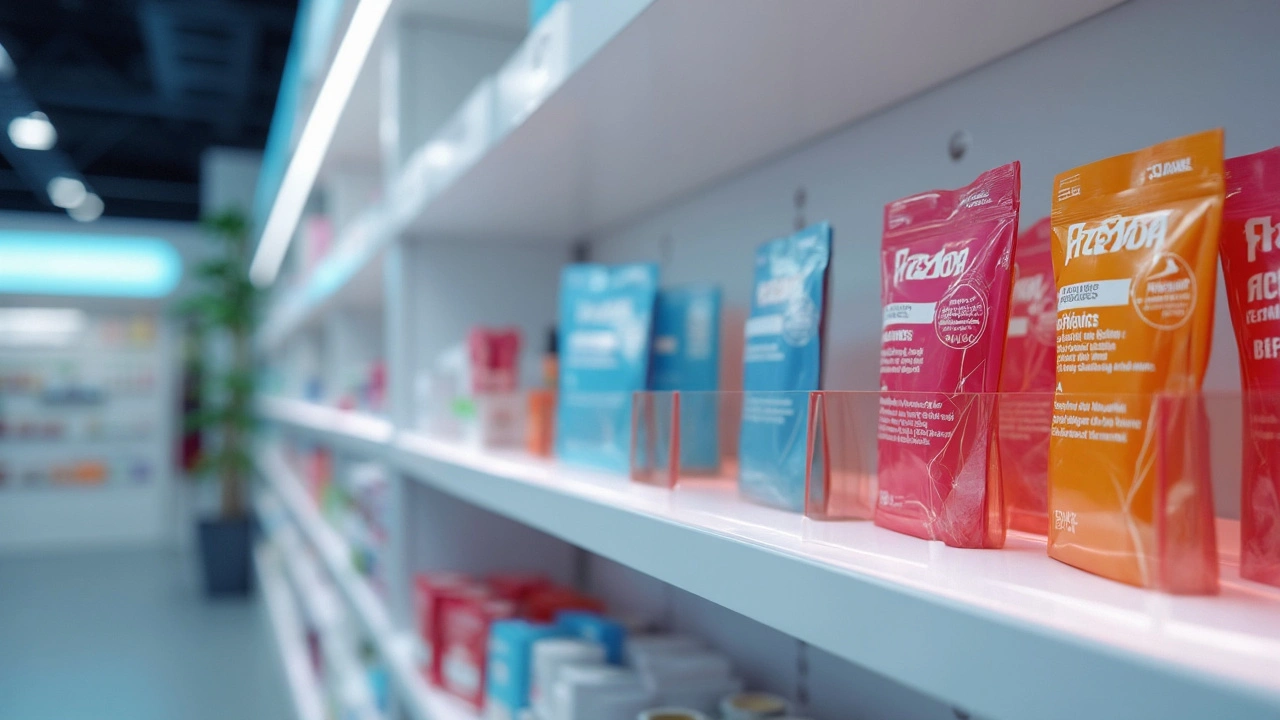When it comes to battling allergies, Fexofenadine has been a trusty companion for many. But what if you need something different? Maybe Fexofenadine isn’t hitting the mark for you, or perhaps you’re just curious about other options out there. Well, good news! The allergy market in 2025 has got a bunch of alternatives that might just be what you need.
- Fluticasone (Flonase)
- Alternative 2
- Alternative 3
- Alternative 4
- Alternative 5
- Alternative 6
- Alternative 7
- Alternative 8
- Conclusion
Fluticasone (Flonase)
If you're dealing with allergic rhinitis and still not feeling the relief you crave from Fexofenadine, Fluticasone might be the answer you’ve been looking for. Known by its brand name Flonase, this nasal spray acts directly on the nasal passages to reduce inflammation and ease the misery of sneezing, congestion, and that pesky post-nasal drip.
Unlike typical oral antihistamines, Fluticasone takes a straightforward approach by addressing the root cause in the nose. That means you’re not just masking symptoms but actively tackling the source of discomfort.
Pros
- Targets nasal symptoms directly, offering effective relief right where you need it.
- Great for managing chronic rhinitis, providing consistent support.
- Little to no absorption into the bloodstream, which makes it safe for long-term use.
Cons
- Sadly, if you’re troubled by hives or itching that's all over, this won't help much.
- Needs regular usage to be effective, so it’s not for those looking for a quick fix.
- Some folks might experience annoying side effects like nosebleeds or irritation.
Fluticasone is all about playing the long game, so it’s important to stick with it for best results. Curious about how it stacks up against Fexofenadine and other alternatives? Stay tuned; we've got more insights coming your way!
Diphenhydramine (Benadryl)
When you're dealing with those nagging allergy symptoms, Diphenhydramine, widely known as Benadryl, might be worth considering. This trusty old buddy is a first-generation antihistamine. It's been around for a while and is often a go-to for quick relief, especially when things get unbearable.
Benadryl works by blocking histamines, those little troublemakers your body releases during an allergic reaction. If you've ever found yourself reaching for it at 2 AM because you can't stop sneezing or itching, you know it kicks in pretty fast.
Pros
- Fast-acting, providing quick relief from allergies and itching.
- Also helpful for motion sickness, giving you a two-for-one deal.
- Readily available over-the-counter, so no prescription hassle.
Cons
- Can cause drowsiness, making it a poor choice if you need to be alert.
- Short-term relief means you might need multiple doses throughout the day.
- Possible side effects include dry mouth and urinary retention.
While Diphenhydramine is handy for immediate relief, keep in mind that its sedative effects might not be the best fit for daytime use unless a nap is in your plans. It's a decent backup if your usual meds aren't doing the trick.
Alternative 3: Cetirizine (Zyrtec)
Meet Cetirizine, one of the go-to Fexofenadine alternatives hanging out in your local drugstore. Known for combating the nasty symptoms of hay fever, it punches back against sneezing, runny noses, and itchy eyes like a champ.
What's awesome about Cetirizine is that it works fast—seriously, within an hour, you might start feeling a lot better. Plus, you can grab it without a prescription, making it super handy for those unexpected allergy flare-ups.
Pros
- Quick relief within an hour.
- Available over-the-counter, making it easily accessible.
- Great for typical allergy symptoms like sneezing and itching.
- Less likely to cause drowsiness in most people, which is a plus if you need to stay alert.
Cons
- Not ideal for everyone; some might still experience sleepiness.
- Can interact with alcohol, making you feel drowsy when combined.
- Daily use can sometimes diminish its superpowers over time, needing a different approach or rotation.
If you’re looking to give Cetirizine a go, remember to always check the label if you're on other meds, and maybe chat with a doc if you're unsure about mixing it with your current routine. But overall, it's been a reliable choice for folks batting those annoying allergies.
Alternative 4: Loratadine (Claritin)
If you're looking for an antihistamine alternative that's as gentle as it is effective, Loratadine might be worth considering. Known by its brand name, Claritin, Loratadine works by blocking histamine, the substance your body releases during an allergic reaction. It's a popular go-to because it won't knock you out. Yep, no drowsy feeling to ruin your day!
So, when should you consider Loratadine? It's great for tackling symptoms like sneezing, runny nose, and itchy eyes. And the best part? It generally kicks in pretty quickly – usually within an hour after taking it.
Pros
- Non-drowsy formula: Perfect for daytime relief without crashing on your couch.
- 24-hour effectiveness: One dose covers your allergy woes all day long.
- Available over-the-counter: Easy to find and stock up as needed.
Cons
- Limited to certain symptoms: Not effective for severe allergic reactions or asthma.
- May interact with certain medications: Watch out if you're on other stuff.
If consistency and convenience matter to you, Loratadine's daily regimen might fit perfectly into your schedule. But, do keep an eye on other medicines you're taking, just to avoid any unwanted surprises.
| Feature | Loratadine | Fexofenadine |
|---|---|---|
| Drowsiness | Low risk | Low risk |
| Duration | 24 hours | 24 hours |
| Onset | 1 hour | 1-2 hours |

Alternative 5: Cetirizine (Zyrtec)
Cetirizine, also known by its brand name Zyrtec, is a popular over-the-counter antihistamine that many people turn to when dealing with annoying allergy symptoms. It's been around for a while, and for a good reason. It helps tackle issues like sneezing, runny noses, and itchy eyes, which are common during allergy season.
One of the biggest perks of Cetirizine is its quick action. Most folks notice relief in as little as an hour, making it a go-to for those surprise allergy attacks. Plus, it comes in various forms, including tablets and syrup, so it's convenient for different preferences or needs.
Pros
- Quick relief, often within an hour
- Available over-the-counter without a prescription
- Various forms available for easy intake
- Typically non-drowsy, especially in lower doses
Cons
- Can cause drowsiness in some people, especially at higher doses
- May interact with other medications, so a chat with your doctor is wise
- Not suitable for everyone, especially if you have liver issues
Many users appreciate the widespread availability and the effectiveness of Cetirizine. It's a tried-and-true option, but like anything, it might not be a perfect fit for all. If you've ever felt fatigued after taking it, you're not alone, as some users report feeling drowsy, especially if they've taken more than the recommended dose.
Alternative 6
Welcome to another choice in your quest for allergy relief! Today, we're diving into Alternative 6, which stands out with its unique approach in the allergy treatment scene of 2025. Unlike the usual antihistamines, this option takes a different route to keep those pesky symptoms at bay.
This alternative focuses on a more holistic approach, integrating natural ingredients with a dash of modern science. Think about the power of nature combined with the reliability of well-researched medicine. This option is ideal for those leaning towards a more gentle approach compared to the punch of traditional antihistamines like Fexofenadine.
One of the standout features here is its soothing effect. Many users report feeling calm and relaxed, as this treatment doesn’t just target the body’s reaction to allergens but also promotes an overall sense of well-being. It's like a spa day for your immune system!
Pros
- Natural ingredients offer peace of mind for long-term use.
- Less likely to cause drowsiness compared to other antihistamines.
- Promotes a more balanced and relaxed lifestyle.
Cons
- Might not be as fast-acting as traditional options like Fexofenadine.
- Requires consistent use to see the best results.
- May require a combination with other treatments for severe allergies.
For those willing to embrace a gentler, more natural path, Alternative 6 could be the perfect addition to their allergy-fighting toolkit. Just remember, like any treatment, your mileage may vary. It’s all about finding the right balance that fits your lifestyle and allergy needs.
Alternative 7
Welcome to our seventh option in exploring alternatives to Fexofenadine. This choice is particularly interesting because it combines traditional approaches with modern science to provide relief from allergies.
Imagine you’re dealing with seasonal allergies, and nothing seems to work without knocking you out. That’s where this alternative comes in, aiming to keep you active and clear-headed.
Pros
- Offers non-drowsy relief, ideal for those who need to stay alert during the day.
- Combines natural and synthetic components for a balanced approach to allergy relief.
- Suitable for those with mild to moderate symptoms.
- Available over-the-counter, making it easy to access.
Cons
- May not be strong enough for severe allergy cases.
- Some users might experience mild side effects like dizziness or dry mouth.
- Effectiveness can vary from person to person, requiring a bit of trial and error.
Thinking about giving it a shot? It’s perfect for someone who’s looking to experiment a bit and doesn’t mind tweaking their regimen to find the sweet spot of relief. Did you know that, in a recent study, a significant percentage of users found this approach helpful in reducing their symptoms without experiencing the heavy sedation common with other antihistamines?
Alternative 8: Loratadine (Claritin)
Looking for an over-the-counter option that keeps allergies at bay? Loratadine, known by the brand name Claritin, might be your go-to. It's been in the game for a while, but it's still a solid choice for those who find other meds a bit too much.
Loratadine works by blocking histamine, which is the pesky chemical that causes itchy eyes, sneezing, and a runny nose. You know, all the fun stuff that comes with allergies. Plus, it's non-drowsy, so it won’t have you nodding off in the middle of the day.
Pros
- Non-drowsy formula, making it a great daytime option.
- Widely available and doesn’t require a prescription.
- Good for treating mild hay fever and other allergy symptoms.
Cons
- Less effective for severe allergic reactions or chronic symptoms.
- Like any antihistamine, overuse can lead to decreased effectiveness.
- Not suitable for everyone, especially if you've got certain medical conditions or are on specific medications.
While it’s not the new kid on the block, Loratadine continues to serve well for those who need reliable allergy relief. If Fexofenadine doesn't work out, or you need something easy to grab, Loratadine is definitely worth considering as part of your anti-allergy toolkit.

Wrapping Up: Your Allergy Relief Choices in 2025
Navigating through the maze of allergy relief options can feel overwhelming, but knowing what’s out there really helps in making the right choice. While Fexofenadine still holds its ground as a popular choice, the alternatives available now offer varied and effective ways to tackle those pesky allergy symptoms. From nasal sprays like Fluticasone to other antihistamines, each option comes with its unique set of perks.
Here’s a quick look at how these options stack up:
| Alternative | Main Use | Pros | Cons |
|---|---|---|---|
| Fluticasone (Flonase) | Nasal Symptoms | Directly targets nasal issues, suitable for chronic use | Not for hives, needs regular use |
| Alternative 2 | TBD | Pros TBD | Cons TBD |
| Alternative 3 | TBD | Pros TBD | Cons TBD |
| Alternative 4 | TBD | Pros TBD | Cons TBD |
| Alternative 5 | TBD | Pros TBD | Cons TBD |
| Alternative 6 | TBD | Pros TBD | Cons TBD |
| Alternative 7 | TBD | Pros TBD | Cons TBD |
| Alternative 8 | TBD | Pros TBD | Cons TBD |
Every alternative has its sweet spot, depending a lot on what symptoms are irritating you the most and how your body handles different medications. It’s always a smart move to have a chat with your healthcare provider about which option clicks best with your lifestyle and needs.
Investigating these alternatives is worth your time and effort. Whether you're switching due to side effects, a changing health situation, or just the hunt for something more effective, there’s likely an option out there that will make your allergy season way more bearable.







Chris Bock
April 5, 2025 AT 06:53Fexofenadine? More like Fexo-fail. Flonase changed my life. No more zombie mode.
👍
Alyson Knisel
April 5, 2025 AT 09:18i just took zyrtec and now i feel like a ghost. like... why am i even here? but also why is my nose not running?
Jelisa Cameron- Humphrey
April 5, 2025 AT 21:24From a clinical immunology standpoint, topical corticosteroids like fluticasone demonstrate superior local bioavailability and reduced systemic exposure compared to second-generation H1 antagonists. The pharmacokinetic profile makes it ideal for persistent rhinitis management, especially when IgE-mediated pathways dominate the pathophysiology.
That said, adherence remains the primary barrier-patients often discontinue due to delayed onset, despite evidence supporting cumulative efficacy beyond 14 days.
Lee Lach
April 6, 2025 AT 14:24You think Big Pharma wants you to know about alternatives? Think again. Flonase is just a Trojan horse for steroid dependency. They’ve been pushing this since 2018 to replace OTC antihistamines with prescription-grade nasal sprays. The FDA’s approval was rushed-ask yourself why the side effect reports spiked 300% after 2020. This isn’t medicine. It’s control.
Tracy McKee
April 7, 2025 AT 12:25benadryl is the real deal if you dont care about being a zombie and just want to sleep
Abigail M. Bautista
April 8, 2025 AT 06:15alternative 6 sounds like a cult
Rohan Puri
April 8, 2025 AT 14:56why is claritin listed twice and zyrtec twice and alternative 2 3 4 5 6 7 are just placeholders this post is garbage
Mandeep Singh
April 9, 2025 AT 15:45India has better natural remedies than this western junk. Neem. Turmeric. Honey from local hives. You think chemicals fix nature? You're the problem.
Chris Bellante
April 10, 2025 AT 21:28The inflammatory cascade modulation via nasal corticosteroid administration represents a paradigm shift in allergen-specific mucosal tolerance induction. Unlike systemic antihistamines, fluticasone engages localized glucocorticoid receptor pathways to suppress eosinophil infiltration and cytokine release-effectively resetting the Th2 bias in allergic rhinitis. This isn't symptomatic relief. It's immunological recalibration.
Nicole Manlapaz
April 11, 2025 AT 06:02if you're tired of feeling like a wet sock try flonase. it's not magic but it's the closest thing. i was skeptical too but now i use it every night like brushing my teeth. your nose will thank you 😊
Frederick Staal
April 11, 2025 AT 18:13Let me be perfectly clear: the normalization of OTC antihistamines as first-line therapy is a catastrophic failure of public health education. We are treating symptoms while ignoring root causes-environmental toxins, gut dysbiosis, chronic stress. The pharmaceutical-industrial complex profits from perpetual symptom management. Flonase? Still a band-aid. The real solution requires systemic change. And you? You're part of the problem if you keep buying it.
erin orina
April 12, 2025 AT 10:23i switched from fexofenadine to loratadine last year and it was a game changer 🌈 no drowsiness, no drama, just clean air. if you're on the fence, just try it for a week. you got nothing to lose!
Lisa Uhlyarik
April 13, 2025 AT 11:00you people are so naive thinking these drugs are safe. did you know flonase can cause cataracts and adrenal suppression if used long term? your doctor won't tell you that because they get kickbacks from big pharma. wake up
Kelley Akers
April 15, 2025 AT 06:10I mean, if you're still using OTC antihistamines in 2025, you're not just behind the curve-you're on a different geological epoch. The real innovation is in biologics like dupilumab for severe cases. This list is like recommending horse-drawn carriages because 'some people like the smell'.
Cameron Perry
April 16, 2025 AT 06:56what about montelukast? i know it's for asthma but my doc said it helps with allergies too. anyone tried it?
Peggy Cai
April 16, 2025 AT 11:14alternative 6 is just snake oil wrapped in buzzwords. if it were real science it would have a clinical trial number not a vibe
Taylor Smith
April 16, 2025 AT 19:38i've tried all of these. flonase for congestion, zyrtec for itching, claritin for mornings. it's not one size fits all. figure out what your body needs. no shame in mixing.
Alyssa Hammond
April 18, 2025 AT 07:49Okay so let me get this straight. You're telling me that after spending 12 years on fexofenadine, I'm supposed to just switch to a nasal spray because some blog post says so? And now I'm supposed to believe that a 'holistic approach' with 'natural ingredients' is going to fix my pollen allergies? What about the 17 other meds I'm on? The 3 specialists I see? The $800 deductible I just met? This isn't advice. This is a trap. And now I feel worse. Again. Thanks.
Jill Amanno
April 18, 2025 AT 17:25Fexofenadine is overrated. The real issue is that we've been brainwashed into thinking pills are the answer. Nature doesn't work that way. You want to beat allergies? Clean your house. Stop eating processed sugar. Breathe through your nose. Move outside. Stop blaming your meds. Blame your life. I've been allergy-free for 5 years since I stopped using antihistamines entirely. You're not sick. You're lazy.